Text
English words derived from Scottish Gaelic
English really is the bastard tongue, so much of it comes from so many places. Of course there’s the obvious ones like jalapeño, spaghetti, déjà vu, etc. Even for Scottish Gaelic we use cèilidh which most know is borrowed, but there are some hidden ones! Thought I’d share cause I find this stuff p cool
Galore - Comes from Scottish Gaelic ‘gu leòr’ (or Irish ‘go leór’) which means sufficient or enough. Funny how it came to mean abundance lol
Whiskey - This one I already knew a while ago, but it derives from ‘uisge-beatha’ which meant water of life. It was then shortened to whikseybae and now, whiskey
Clan - This one isn’t too surprising, but still interesting. It comes from ‘clann’ in Scottish Gaelic which meant children. It’s easy to imagine the context of the Fraser Clann becoming the Fraser Clan we know today
Slogan - Now this one was a shock! Slogan is from ‘sluagh-ghairm’, a battle cry or word-for-word, army shout. It evolved from a designated expression for an army to one for a political party, and today for anything really
50 notes
·
View notes
Text
Random gàidhlig mnemonics
sgian [knife f.] - sounds like the verb ‘to skin’. Knives can be used to skin things and other similar uses
sgillin [penny f.] - so similar to shilling! I’m going to assume that’s the origin till I google the etymology
not [pound] - sounds like note $$$
latha [day] - sounds like long if you were to yawn and exhale while saying it, which makes me think of someone coming home from work and yawning “long day”. A bit of a reach but it clocks in my mind lol
stais [moustache f.] - this is literally just ‘stache
mac [son] - mac!! Like in last names mac! Macgreggor, Macdonald, Macmillan…. Equivalent to Robertson, Stevenson, Johnson
leabhar [book] - like the french word livre
#i always find the ways people memorize things interesting#thought id put my mind jumble somewhere :]#mnemonics#gàidhlig#scottish gaelic
8 notes
·
View notes
Text
So we don’t actually need the words yes or no. They’re just shortcuts. Can’t believe I only just realized this because Scottish Gaelic doesn’t have em
2 notes
·
View notes
Text
Country Names in Gàidhlig (Scottish Gaelic)
All translations found in “The New English-Gaelic Dictionary” by Derick S. Thomson. Let me know if you have any translations to add!
Africa : Afraga
America : Ameireagaidh
Asia : An Aisia
Australia : Astràilia
Austria : An Ostair
Belgium : A’Bheilg
Britain : Breatainn
Canada : Canada
Chile : An t-Sile
China : Sìna
Cornwall : A’Chòrn
Denmark : An Danmhairg
Egypt : An Eiphit
England : Sasainn
Ethiopia : An Aetiòp
Europe : An Roinn Eòrpa
Finland : Suòmi
France : An Fhraing
Germany : A’Ghearmailt
Greece : A’Ghrèig
Greenland : A’Ghraonlainn
Hungary : An Ungair
Iceland : Innis Tile
India : Na h-Innseachan
Indonesia : An Ind-Innse
Iran : An Iarain
Iraq : An Iarac
Ireland : Eirinn
Isle of Mann : Eilean Mhanainn
Israel : Iosrael
Italy : An Eadailt
Jamaica : Siameuca
Japan : An t-Seapan
Jordan : Iòrdan
Kenya : A’Cheinia
Korea : Korea
Latvia : An Laitbhe
Libya : Libia
Luxembourg : Lucsamburg
the Netherlands : An Isealtìr
Norway : Lochlann
Pakistan : Pacastan
Palestine : Paileastain
Poland : A’Phòlainn
Portugal : A’Phortagail
Romania : Romàinia
Russia : Ruisia
Scotland : Alba
Spain : An Spàinn
Sweden : An t-Suain
Switzerland : An Eilbheis
the United Nations : Na Dùthchannan Aonaichte
United States : na Stàitean Aonaichte
Wales : A’Chuimrigh
680 notes
·
View notes
Text
Tip for those learning Celtic languages:
SING SOME GODDAMN SONGS
No seriously, learn how to sing songs in your language. It doesn’t even matter if you comprehend the lyrics, the main goal is picking up the phonetics! The bardic tradition is a huge part of Celtic identities, especially for the Gaels of Scotland, Ireland, and Nova Scotia through the ceilidh. There’s also a pretty strong tradition in Wales through Eisteddfod. So by learning your language through song you’re learning pronunciation and flow whilst maintaining an ancient tradition!
1K notes
·
View notes
Text
In Scottish Gaelic we don’t say “You’re welcome” we say “se do bheatha (shay doh veha)” which means “It’s your life” as in “Your life depended on it of course I helped you” and I think that’s beautiful.
Submitted by @fluidpuck
1K notes
·
View notes
Text
Can I interest you in a Gàidhlig Sea Shanty?
20K notes
·
View notes
Text
Okay okay okay but so the first one is simple! Vocative is when you’re adressing someone, so the noun (person) changes and gets an ‘a’ before it if the first letter is a consonant, to my understanding. Cool
Just learnt that scottish gaelic has cases :,)
15 notes
·
View notes
Text
Just learnt that scottish gaelic has cases :,)
#well at least russian has somewhat prepared me for this#scottish gaelic#grammatical cases#russian#study#language#gàidhlig
15 notes
·
View notes
Text
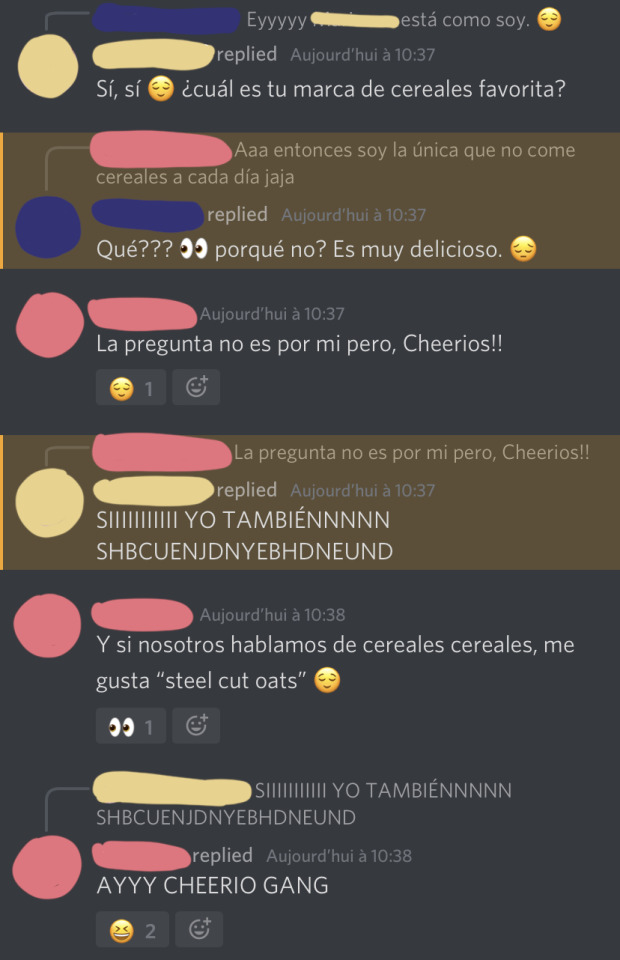



Highlights of a spanish conversation with my friends from today as practice, somehow we reached the topic of cereal
Bonus gàidhlig:

#languages#text#español#spanish texts#spanish#study#bilingual#polyglot#scottish gaelic#gàidhlig#discord#funny#beanie texts
3 notes
·
View notes
Text
First time getting back into gaelic since a while, did a lil revising and realized that ‘muc’ sounds a lot like muck lol. Imma be using that from now on 🐽
3 notes
·
View notes
Text
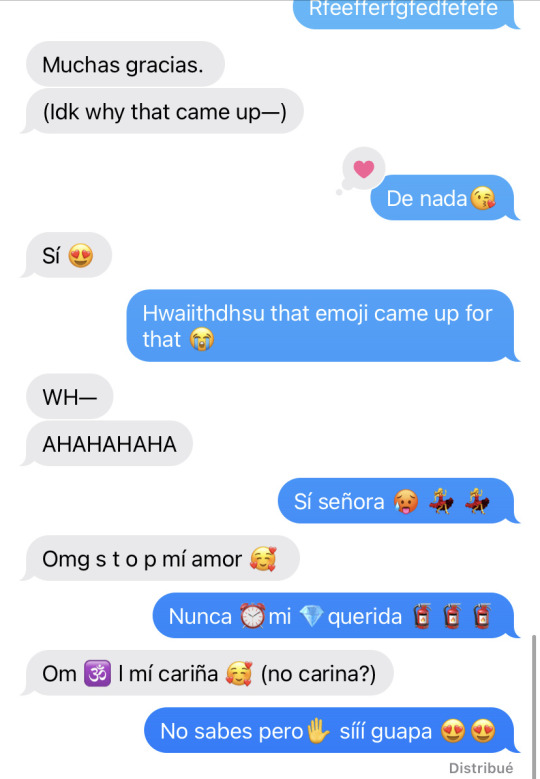
Me and my friend went on a sudden tangent needless to say,,
#id like to personally apologize to everyone reading this#spanish texts#español#spanish#study#bilingual#text#language#funny#beanie texts
0 notes
Text
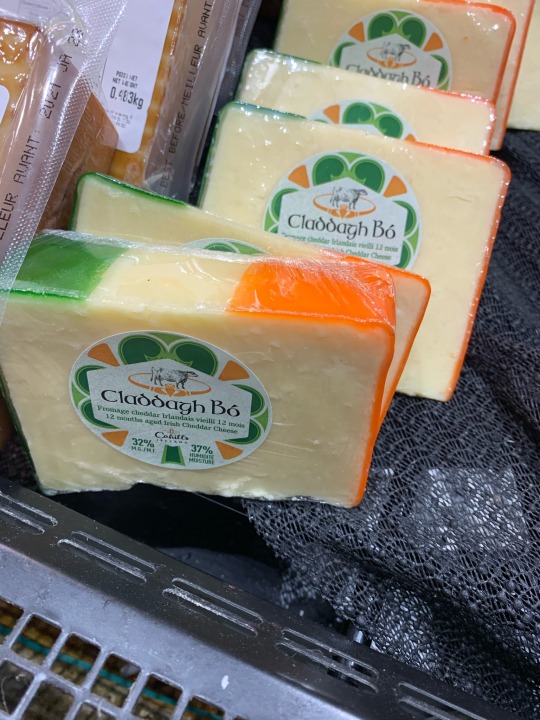
I can’t express how much of an idiot I looked like jumping around in the dairy section because I recognized bó as cow from knowing it in Scottish Gaelic
3 notes
·
View notes
Text
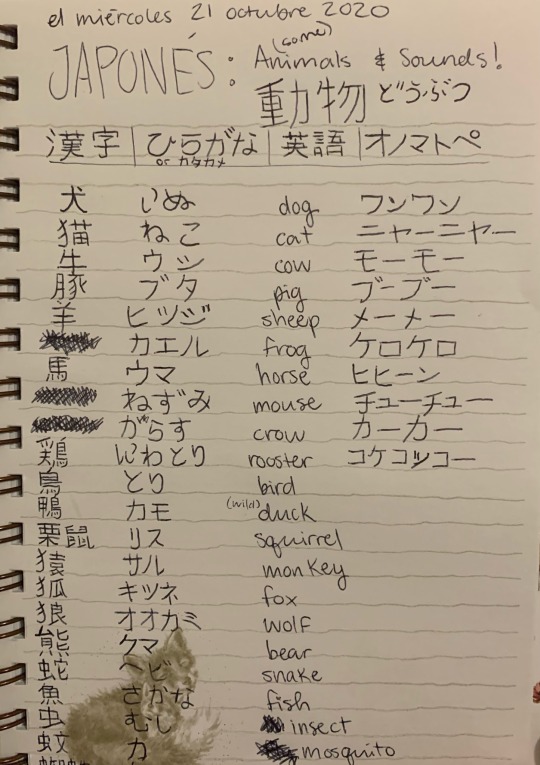
Messy, but I’ve been feeling inspired to learn Japaness recently. Just found out another friend of mine started taking classes too!
Useful link with a list of animals:
https://www.learn-japanese-adventure.com/japanese-animals.html
6 notes
·
View notes
Text
Basic Gáildhig Sentences #1
(“Gáildhig” is the native word for Scottish Gaelic)
Currently on my 43 day streak on Duolingo, and thought I’d post some basic sentence patterns for Gáildhig (gah-lik). When I first started studying Japanese what got me through a lot of conversations was learning sentence patterns (which were heavily emphasized by the podcast I was listening to), that I could pop new words into when I learned them, instead of learning a lot of vocabulary I would forget easily.
So here’s the sentences I’m seeing most commonly, mostly from Duolingo and LearnGaelic! And some words to fit into them for the absolute beginners.
–Words in parentheses are pronunciations of the previous word–
“This is”, “Is”, and “It isn’t”.
Seo _____ (shoh _____) // This is _____.
Tha _____ (hah _____) // It is _____, or _____ is _____
Chan eil_____ (hahn eel_____) // It isn’t ______, or ______ isn’t _____
Seo is translated to “This is”, since they are both demonstrative pronouns. Seo cofaidh (shoh cawfee) means “This is coffee”. You, in this situation, are demonstrating that this is, indeed, coffee.
Tha is usually translated as “Is” or “It is”. It can be used similarly to Seo, but is a personal pronoun rather than demonstrative. It is a third person pronoun much like ‘he’ or ‘she’ (which in Gáildhig is e (eh) and i (ee) respectively). Tha gràindeag (ha granyak) is “It’s a hedgehog”. Tha gràindeag stampa (hah granyak stahm-puh) is “The hedgehog is cute.”. In the last sentence, rather than being “It is”, it functions more like “is”.
Finally, Chan eil is the negative form of the previous two. Chan eil uisge-beatha (hahn eel ooshka beh-heh) means “This is not whiskey” or “It is not whiskey”.
And… that’s it! Here’s ten more phrases to practice your Gáildhig!
Dulich (doo lichk) // Sorry
Hálo (hah loh) // Hello
Tìoraidh (cheerie) // Goodbye
Cimar a tha sibh? (kimahr a hah shiv) // How are you?
Tha mi gu math (hah mee goo mah) // I’m fine
Tapadh leat OR Tapadh leibh (tahpah let OR tahpah leiv) // Thank you (casual and formal, respectively)
Mas e do thoil e (mass e doo holl eh) // Please (if using in a sentence, it comes after whatever you are requesting. Pasta mas e do thoil e is “Pasta, please”. And yes, pasta is pronounced the same
a h-aon (ah hoon) // One
a dhà (ah ghaa) // Two
a trì (ah tree) // Three
52 notes
·
View notes
Text
Some basic Gaelic questions
I was doing a little bit of prep for my beginners Gaelic group tonight and thought I’d share some of the questions that we’ve covered over the past few months. I will do the answers, but we’re going to go over them all together tonight, so I thought I’d just post these for now as I may not have time to type everything up for a few days.
Here they are:
Dè an latha a th’ann an-diugh? What day is it today?
A bheil e fuar an-diugh? Is it cold today?
Cò tha seo? Who is this?
Dè an aois a tha thu? What age are you?
Ciamar a tha an t-sìde an-diugh? What is the weather like today?
A bheil peansail agad? Do you have a pencil?
Dè an t-ainm a th’ort? What’s your name?
Dè tha thu ag iarraidh? What do you want?
Dè tha seo? What is this?
Ciamar a tha thu/sibh? How are you?
Dè an dath a tha seo? What colour is this?
An toil leat a’ dannsadh? Do you like dancing?
A bheil piuthar agad? Do you have a sister?
Càite a bheil do chluas? Where is your ear?
A bheil peata agad? Do you have a pet?
19 notes
·
View notes
Text
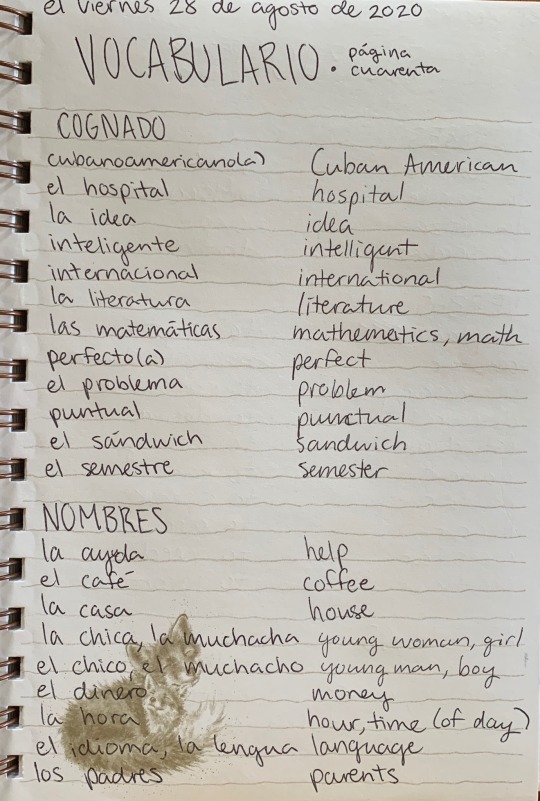
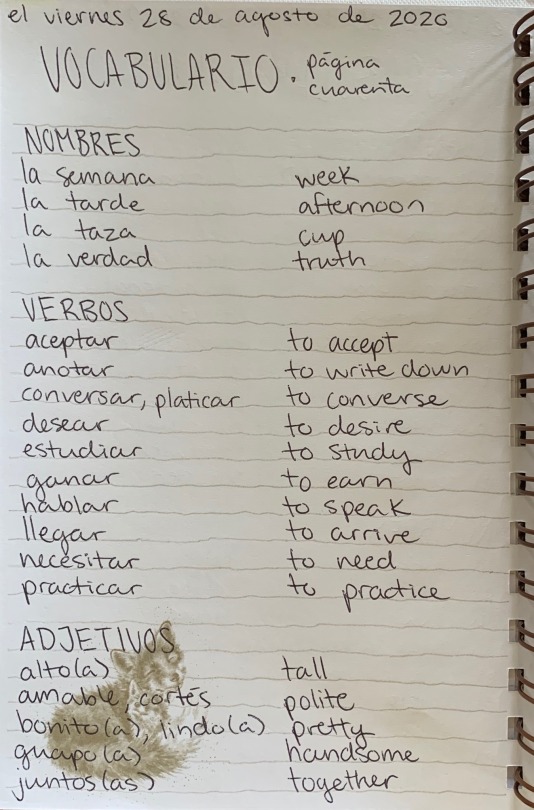


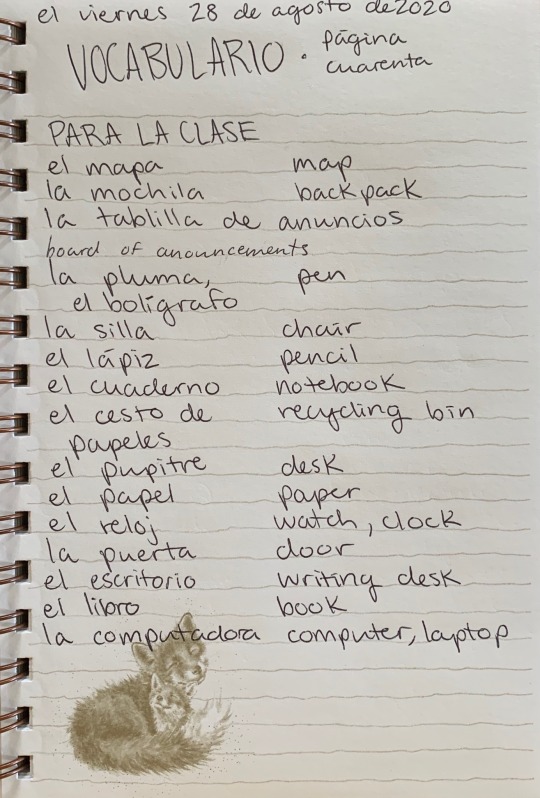
Woooo! Muchas palabras hoy. A bit messy, but I wanted to jot everything down for this chapter.
There are quite a few mistakes (why is ‘mi’ in adjetivos?? Complete chaos in what’s considered a whiteboard) but at least it’s still legible lol.
#chapter 2#bilingual#polyglot#language#language notes#vocabulario#spanish vocab#español#spanish#spanish notes
2 notes
·
View notes